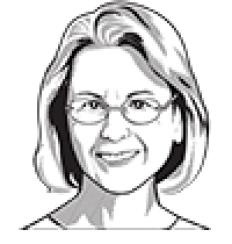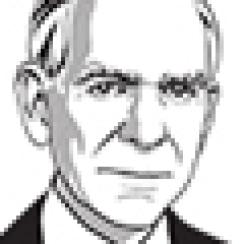
Shuman learned about contrarian investing when she went to work for David Swensen at Yale in 1986, a year after the CIO’s hire. There she became director of investments, eventually taking responsibility for all capital markets and real estate activities. One of the key lessons Shuman took away from her mentor: “You always want to be buyers when everyone else is selling.”
In a notable example of going against the investment grain to make what would become a landmark transaction, the Yale Investments Office decided in 1994 during the real estate meltdown to purchase the 50 percent it didn’t own of a prime property in midtown New York City — 717 Fifth Avenue — for only $47 million. “At the time, it was a very scary thing to do,” recalls Shuman. Yale sold the 26-story office building eight years later for a reported $266 million.
Carnegie president Vartan Gregorian recruited Shuman to build out the foundation’s investment office. From her January 1999 start date, Carnegie’s first CIO implemented a set of strategies that dramatically diversified the portfolio, globally and by asset class, generating investment performance that exceeded the organization’s policy benchmark. During Shuman’s tenure the foundation grew its assets to $2.55 billion from $1.5 billion while spending more than $1 billion on grants fostering world peace, democracy and the advancement of knowledge in the U.S., the U.K. and sub-Saharan Africa. Among Shuman’s best calls: two large private equity sales in the secondary market in late 2007 and early 2008, the decision to use stock futures to rebalance the portfolio in early 2009 after equities had gotten crushed and a bet on subprime residential-mortgage-backed securities in late 2009 and early 2010.
In 2011, her final year at Carnegie, Shuman produced a 6.1 percent return, more than double the 2.9 percent gain of the foundation’s benchmark. This performance resulted from the fund’s exposure to high-quality hedge funds, venture capital, real estate and resources, and leveraged buyouts. Despite her long-term track record of outsize returns, Shuman is most proud of the team she built, particularly the co-CIOs who succeeded her, Kim Lew and Meredith Jenkins.
At 59, Shuman is embarking on her next challenge: operating an outsourced-CIO firm to bring her decades of investment experience to other institutions. Her partner at New Haven, Connecticut–based Edgehill Endowment Partners is Nina Scherago, a 13-year veteran of The Investment Fund for Foundations (TIFF) with ten years’ experience at the Howard Hughes Medical Institute. Introduced to Scherago by Swensen while still at Yale, Shuman has come full circle.





|





|






